Working in a call center is quite different today than just a few years ago. People can connect with businesses over many different channels but still call in with questions and concerns. That’s where call center agents can provide an immediate, personalized response in a dedicated fashion. This approach helps companies improve customer experience (CX) and customer satisfaction, no matter the reason for the call.
Contact centers and call centers are thriving in the virtual space, meaning demand for U.S.-based call center agents is high. The Bureau of Labor Statistics estimates almost 375,000 related job openings every year through 2032. This means that call center jobs are rising, and demand is high for in-house call centers.
Before you send off that resume, check out what it’s like to work in a call center, the pros and cons, the different positions and their requirements, and tips for succeeding in a call center.
Think you’d be a good fit for an in-house or remote call center position?
Check out what it’s like to work in a call center and learn how it’s evolving from years past.
Pros and Cons of Working in a Call Center
Call center jobs are communication-heavy and require lots of phone and computer time. Agents can grow and develop lifelong skills with call center roles and get to help people while they do so.
Check out these pros and cons:
| Pros of Working in a Call Center | Cons of Working in a Call Center |
|---|---|
| Gain valuable and transferable customer service skills | Deal with high turnover |
| Become a skilled and adaptable communicator | Face unpredictable hours and stressful conversations |
| Help people solve problems and address issues | Manage burnout with a sedentary and repetitive job |
| Thrive in a structured environment that’s accessible to remote workers | Limit career growth with little upward mobility |
To help avoid burnout and manage stress, take screen breaks and use ergonomic office equipment, including your chair and keyboard.
7 Call Center Skills to Succeed in the Role
Call center employees are the front line when it comes to customer service. Customers expect each agent to go the extra mile to provide top-tier customer service. Sixty-three percent even want agents to know their unique needs and expectations.
Excellent customer service isn’t always easy, though — especially over the phone.
Successful, productive call center representatives have these traits to deliver stellar customer service.
1. Customer-centric outlook
Having an overwhelming desire to help customers all the time is a benchmark trait for call center representatives. If you enjoy making memorable experiences and the opportunity to create brand ambassadors from each call, you may enjoy working in a call center. Being customer-centric means that you’re only happy if the customer is happy.
2. Basic computer literacy and typing skills
Roughly 25% of call center job duties include post-call data entry and computer admin work. The larger part of the job is actively speaking with someone on the phone, but computer literacy is important to succeed as a call center agent.
It’s a benefit to have experience with:
- Different types of CRM software
- Mobile messaging apps
- Basic understanding of cloud telephony
If you can type quickly, you’ll probably feel more comfortable with the role. Around 60 words per minute is a good benchmark, and faster is even better. As long as you can access screens with customer information, you can brush up on computer literacy and practice your typing to improve.
3. Stellar communication
Communication is one of the most important skills in many jobs, but it’s especially crucial in a call center. Most customer service tips revolve around communication improvements, like showing empathy or setting expectations.
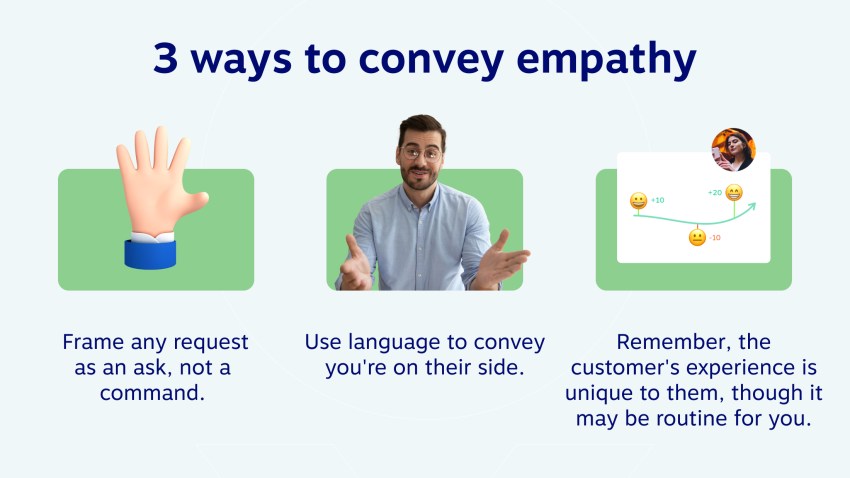
The best call center communicators can:
- Speak clearly with a strong phone voice that conveys trust to build rapport.
- Listen attentively and ask questions, rephrasing if necessary to get to the real issue.
- Respond patiently without frustration to come up with solutions that please everyone.
- Document accurately for record-keeping purposes without major errors.
The better you communicate, the more quickly you can address customer concerns.
4. Efficient problem-solving
Callers want their issues resolved ASAP. Agents must leap into action when their line rings, reduce hold times, and figure out resolutions before callers get annoyed.
However, working in an inbound call center can be unpredictable. No two calls or callers are ever the same, and relay calls (assisting people with hearing or speech disabilities) can last much longer than traditional calls.
Sometimes, you can’t follow the protocol for certain unpredictable situations. It helps to be quick on your feet and come up with solutions that help callers on the fly. The faster you can solve customer problems, the higher your first call resolution (FCR) numbers can climb by closing customer tickets on the first call.
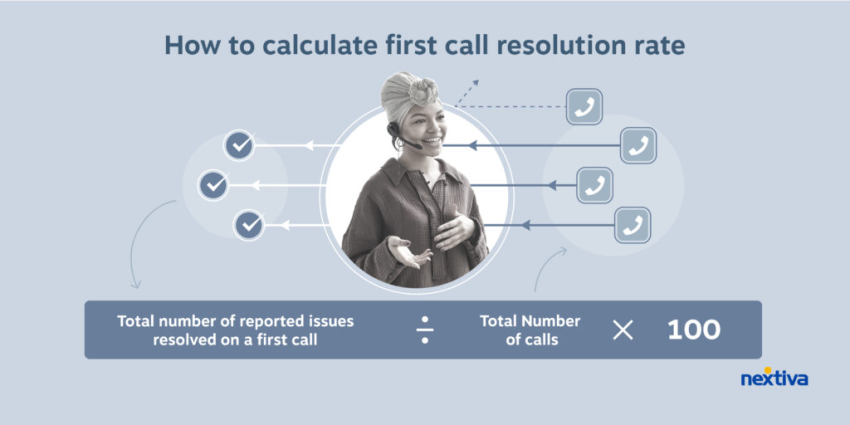
5. Organized multitasking
If you want to work in a call center, you’ll need to be able to multitask — and handle all your tasks with speed and accuracy. Call center agents may need to juggle many outreach channels, which means talking, typing, and listening nearly simultaneously.
Be prepared to switch between:
- Live chat
- Phone calls
You may engage with over 50 customers per day, and multitasking becomes more difficult the more callers you engage. You need laser focus and keen organization to keep it all together.
6. Company and product knowledge
You don’t need to memorize everything about how a company’s products or services work. But you should know how to look up answers quickly if you don’t.
| Example: Outbound call center positions require understanding a company’s unique selling points. Tech support needs to know their company’s lineup’s front- and back-end issues. |
Luckily, many call centers set their agents up for success with a suite of tools, resources, and training programs. The resources include your peers, too — you can ask questions about company offerings to get expert answers from peers who’ve been in your shoes for a long time. Or, conduct a mock customer service call with a peer to test your skills.
7. Flexible scheduling
Working in a call center may mean working outside regular business hours. If you’re only looking for a 9-to-5 role, you may want to keep looking — call centers operate around the clock with very few exceptions in most cases.
Call center employees might work various shifts:
- Overnights
- Weekends
- Major holidays
You may also work overtime hours if the company experiences a recall or significant event and needs all hands on deck. These hours can add stress to call center employees, especially if they’re on-site and have to commute.
Do you have all these skills? Now, see which call center roles interest you most.
Related: Customer Service Call Centers: Top Features & Best Practices
Call Center Positions and Responsibilities
Since you don’t need much work experience, call center jobs make excellent entry-level jobs. Ever dealt with customers? Know how to use a phone and a computer? You’re already qualified!
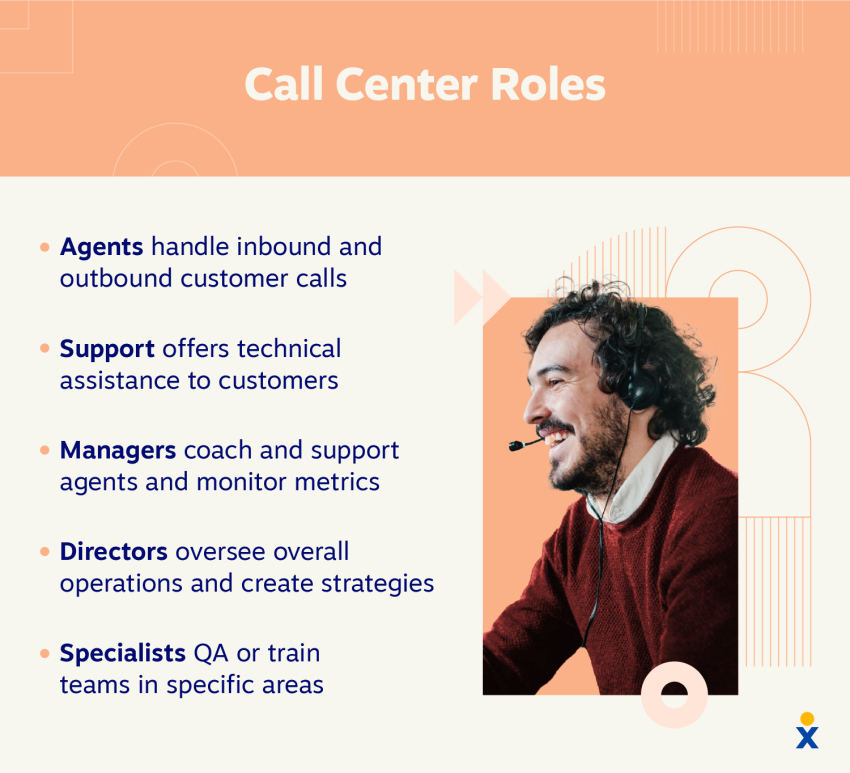
Dedicated call center employees also rise the ranks and advance their customer service careers fast.
You can take your pick of these popular call center jobs:
| Role | Duties |
|---|---|
| Outbound call center agent/telemarketing | Make outgoing calls from a list with goals or quotas, make cold calls, and pitch new leads. |
| Customer service representative | Answer incoming calls, handle account details, and place and track orders. |
| Technical support specialist | Troubleshoot product or service issues remotely. |
| Team leader | Schedule team coverage, train new hires, and track call center metrics as a liaison between agents and management. |
| Quality assurance specialist | Help improve call center operations, monitor agent behavior and data. |
| Call center manager | Track global call center analytics and create strategies to improve. |
Tips for Working in a Call Center
Call center jobs can be simultaneously challenging and rewarding. Agents digest and record gigantic amounts of information. They also set others up for success with detailed, contextual notes about customer interactions. Then, anyone assisting those customers in the future can reference the notes for context.
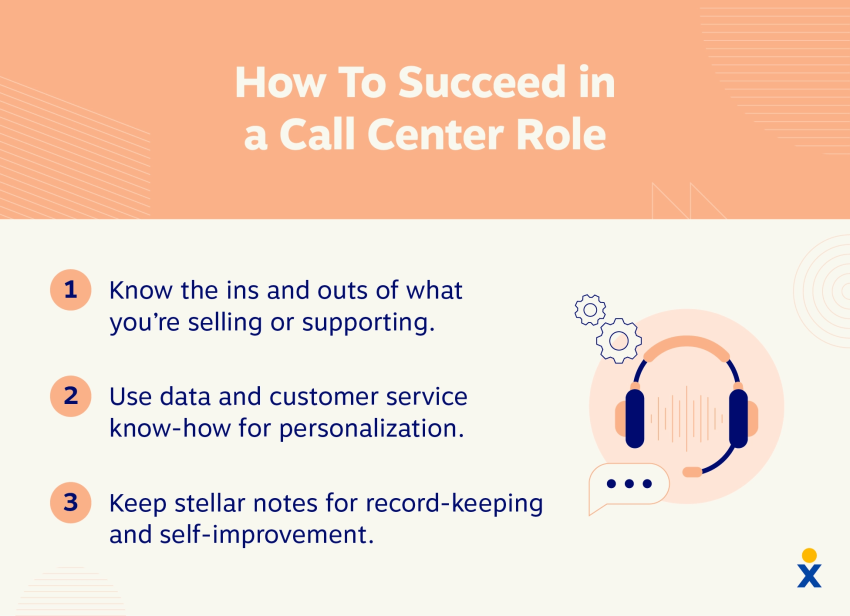
Here are some of the top tips for success in a call center environment.
Get familiar with call center software
Being prepared in a call center involves more than just knowing the basics about the product or service offering. It entails a deep understanding of the ins and outs of what you’re selling or supporting.
Your customer service steps up a notch when you’re able to speak clearly to:
- Noteworthy benefits
- Common limitations
- Troubleshooting steps
You’ll likely need to engage in lots of virtual team communication — consider reaching out to colleagues or supervisors for clarification. Familiarize yourself with training materials or any relevant product information your employer provides.
| 💡Tip: Get acquainted with call scripts and call flow guidelines, and practice delivering them confidently and naturally. Record yourself and play it back, adjusting your delivery until you get it right. |
With a better understanding of the offerings and procedures, you can better equip yourself to address questions, resolve issues, and give accurate information.
Focus on personalizing each experience
Personalization is key to building rapport with callers and improving customer experience. This is true even in challenging situations, like calls with irate customers.
One of the easiest ways to personalize each call is by asking probing questions to gather information. By taking the time to understand caller needs and concerns (which most expect you to do), you can give a personalized response and tailor a solution to their specific issues.
Call center employees can also leverage CRM and call center technology to personalize their service and support.
Review customer history, like:
- Past interactions
- Purchases
- Notification preferences
These notes can give you an idea of their journey with your company and allow you to anticipate their needs better.
Hone your notetaking skills
Effective communication is crucial for call center agents to ensure clarity, understanding, and professionalism. Part of that is indirect business communication, meaning you’re not talking directly to anyone. This is the 25% of the job that requires diligent note-taking.
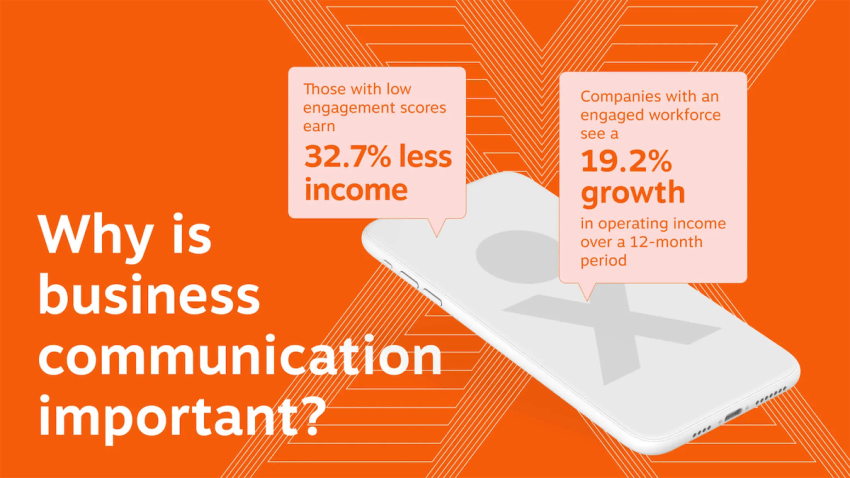
Active listening is key to building out effective notes. Once you take in information, how you structure it will impact how easy it is for agents to help (or sell to) this customer again in the future.
Try these tips when crafting customer account notes:
- Use abbreviations and keywords to reduce length.
- Organize notes by category and use bullets and headings to keep your notes readable.
- Be concise and relevant, focusing on essential details and actionable information.
- Review and verify your notes to ensure their accuracy.
With these tips, you’re set up for an engaging role in helping customers discover solutions and improve their lives.
Thinking About Working in a Call Center?
VoIP solutions are transforming the call center industry for the better. Call center employees can now work from home and climb the ladder to a lucrative customer service career in no time.
Next time you call a contact center, you’ll have a newfound appreciation for their hard work. You may even want to join their team.
Related: 101 Call Center Abbreviations, Acronyms, and Definitions
The call center solution teams love.
Sales and support teams use Nextiva to deliver a better customer experience.
Working in a Call Center FAQs
Check out these call center employees’ frequently asked questions for more information.
A call center job is stable, entry-level, and can help you develop lucrative skills. It requires helping people answer questions, solve problems, and find assistance from the right team. However, it can be repetitive, and there is limited opportunity for upward mobility.
Working in a call center can be demanding and stressful, particularly when dealing with upset callers, high call volumes, or tight deadlines. Stress management techniques like breathing and frequent breaks can help to avoid burnout in a call center job.
The disadvantages of working in a call center are high employee turnover, unpredictable hours, stressful conversations, and long hours with little to no movement.

















 Customer Experience
Customer Experience 













